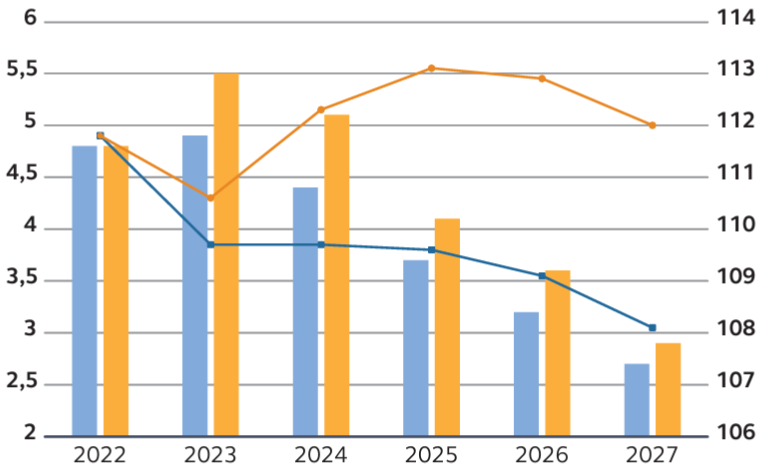France in the Fiscal Firing Line
EU finance ministers gather in Brussels today in a regular meeting but this time will discuss excessive fiscal deficits in various member countries, in particular, Belgium, France, Italy, Hungary and Poland. It is unclear just how specific any criticisms will be either in pointing out particular countries and/or in recommending specific fiscal goals either in terms of time and size. Very much so, France will be high on the agenda, and will be viewed as having an excessive fiscal deficit. But beyond that from the EU, France has already started to face formal fiscal criticism, and from within, namely the ultimate French fiscal arbiter, the Court of Audit, an independent government body, waring of rising debt ratios.
Figure 1: A More Sobering Fiscal Outlook

Source; France Court of Audit, blue bar is previous outlook, yellow is latest.
It said in report issued yesterday that the fiscal situation in France is now worrying. It noted that public debt is posing an increasingly high cost that constrains all other expenditure, undermines the country's investment capacity and dangerously exposes France more to a new macroeconomic shock. It stressed that the situation is all the more worrying since the trajectory for reducing the public deficit does not include the essential investments that will have to be made to deal with climate change.
These worries have now been added to by the formal acknowledgement from the EU that France has an excessive budget gap. The EU says that France should submit a medium-term fiscal-structural plan in a timely manner. In line with the requirements of the reformed Stability and Growth Pact, it should limit the growth in net expenditure in 2025 to a rate consistent, inter alia, with putting the general government debt on a plausibly downward trajectory over the medium term and reducing the general government deficit towards the 3% of GDP Treaty reference value.
As we have underscored previously, the problem is that there is no-one listening, at least effectively, making it even more unlikely that France can 'submit a medium-term fiscal-structural plan in a timely manner' even it wanted to! The recent parliamentary elections delivered a very indecisive result with no sign that any of the three main blocs is able to form even a minority administration. Most notably, the far-left bloc (Nouveau Front Populaire that includes the far-left La France Insoumise, the Greens and the more moderate Socialist and Communists) that won the most seats in France’s parliamentary elections suspended talks aiming to nominate a prime minister and forming a government. However, not all is lost as the clear acrimony with the left-leaning bloc may mean that the more moderate factions within it may consider liaising with the centrist bloc, at least informally. But even so, it is unlikely that any such a potential alliance would be able to agree the kind of fiscal consolidation measures that the Court of Audit itself suggests is needed.